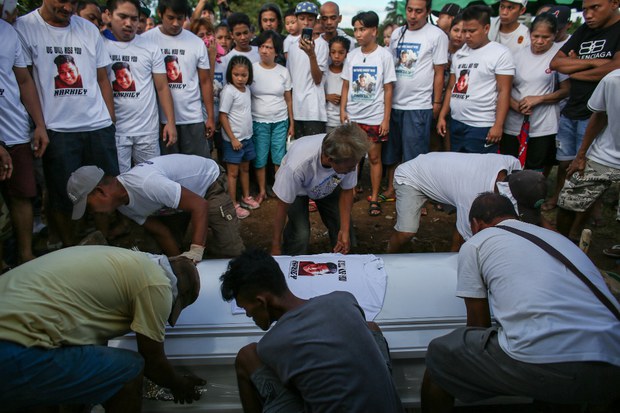Philippine Anti-Drug Campaign has Killed Over 100 Children, HRW Reports
2020.05.27
Manila and Bacolod, Philippines
 Relatives and friends of Mark Anthony Ruivivar, who was killed during a police anti-drug operation, attend his burial ceremony in Manila, Dec. 15, 2019.
Relatives and friends of Mark Anthony Ruivivar, who was killed during a police anti-drug operation, attend his burial ceremony in Manila, Dec. 15, 2019.
More than 100 children have been killed during the Duterte administration’s anti-drug crackdown, and thousands more are suffering emotional trauma and economic dislocation from losing loved ones to it, Human Rights Watch said in a report released Wednesday.
The New York-based group issued its 48-page report ahead of a report on the Philippine drug war that is expected to be released next month in Geneva by Michelle Bachelet, the United Nations High Commissioner for Human Rights.
“Filipino children have suffered horribly from President Duterte’s decision to unleash the police and their hitmen against drug users,” said Carlos Conde, HRW’s Philippine researcher. “The government needs to stop this endless violence that is upending children’s lives and direct assistance to the children harmed.”
For its report, Human Rights Watch interviewed dozens of people including 10 children, parents, non-government organizations and community leaders.
Children’s rights advocates in the Philippines have documented 101 children who have been killed during anti-drug operations from 2016 to 2018, HRW said.
The deaths continue.
HRW reported that Ronjhay Furio, 8, was shot and killed in a Manila district by four gunmen who wore civilian clothes and motorcycle helmets on Jan. 27, as he was buying chicken from a vendor.
More recently, police have used the COVID-19 pandemic as a convenient smokescreen to continue with the killings, HRW alleged.
“The drug war violence did not stop even under COVID-19, based on our monitoring of police and media reports,” said Phil Robertson, the watchdog group’s deputy Asia director.
“There have been almost daily reports of the typical drug war buy-bust or raid that resulted in a killing. One concern for us is that because people and communities are locked down, this means limited chances of people witnessing the drug raids, thus making the violence undocumented, unwitnessed,” Robertson said.
He said Philippine police sometimes manufactured evidence to justify their version of events.
Harry Roque, the spokesman for President Rodrigo Duterte, did not immediately respond Wednesday to a request for comment on the report. The president’s office has repeatedly denied that any of those extrajudicial killings linked to drug cases were state sanctioned.
HRW released the report a day after the birthday of Kian Loyd delos Santos, who was 17 when he was killed by police on Aug. 16, 2017.
Officers mistakenly identified delos Santos as a drug addict and took him to a nearby pigsty where he was shot while begging for his life. Kian’s killing prompted thousands of Filipinos to march against Duterte’s drug war. Three police officers were convicted of charges related to his slaying.
‘Psychological distress’
Amid the ongoing killings, children here have been known to suffer “psychological distress, and all experienced economic hardship made worse by the death of a family breadwinner,” HRW’s report said.
“Some children who lost a family member have faced bullying in their school and community,” Conde said. “Some were forced to live on the streets.
“Police and police-backed vigilantes are responsible for these drug war killings,” Conde said. “The government should provide special support for these children, including redress counseling and other assistance to help them deal with the trauma of losing their loved ones.”
Police have recorded about 6,000 deaths of suspected addicts and dealers who died in shootouts since Duterte came to power in mid-2016, according to official figures.
The number does not include many more who were killed by unknown vigilantes, who typically left signs on corpses warning people of a similar fate if they got tangled in drugs, according to rights groups.
Robert A.
One of those interviewed by HRW for the report, identified only as Robert A., said he stopped going to school at 15 after his father was killed by unknown vigilantes in December 2016. He said he saw four men in two motorcycles shoot his father.
After the shooting, Robert had to work as a garbage collector to feed himself and provide for his siblings.
“I had to work harder when my father died,” HRW quoted him as saying. “I became a father to my siblings because I don’t want to see them suffer. … So I’m doing everything I can. I force myself to work even if I don’t want to. I force myself for me, for my siblings.”
His younger brother, who was 13 at the time, witnessed the shooting. He suffered a leg injury and has become irritable and easily angered.
The two and their sister, who was 10 at the time, no longer attend school and live on the streets of Mandaluyong.
“Our happy family is gone,” he said. “We don’t have anyone to call father now.”
Concluding its report, HRW issued a series of recommendations including calling on Duterte to issue a presidential proclamation officially ending the “war on drugs.” Other recommendations included investigate and prosecute alleged perpetrators, including law enforcement personnel, promptly and fairly compensate victims and fully cooperate with the United Nations Commission on Human Rights.
The report is expected to be followed by the one from Bachelet, the U.N. high commissioner for human rights, in June. Her report is a result of a resolution passed in 2019 by the U.N.’s Human Rights Council. The resolution was backed by 18 council members, while 14 members opposed it and 15 abstained.







